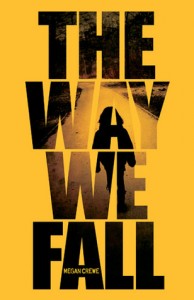I’m thrilled to be hosting Megan Crewe on the blog today. Megan and I spoke about speculative fiction at last November’s CANSCAIP meeting and I found her to be nothing less than profound. I asked her to write up a few words about something every writer thinks about: trends–and I think both writers and readers will enjoy what she has to say.
Megan’s new book, The Way We Fall will be coming out on January 24th. You can read more about it at the end of this post.
The Truth about Trends
by Megan Crewe
 Hang out in writerly circles for very long, and you’ll hear conversation turn toward trends. What genres and topics are publishers scrambling to get more of? Which are almost impossible to sell? Should you try to match your writing to what’s currently hot, or veer off in a new direction?
Hang out in writerly circles for very long, and you’ll hear conversation turn toward trends. What genres and topics are publishers scrambling to get more of? Which are almost impossible to sell? Should you try to match your writing to what’s currently hot, or veer off in a new direction?
It’s hard not to be tempted by the idea that there are strategies (beyond simply writing well) that will make it easier to get your book published. And authors don’t agree on the answer. Some attribute their success to paying attention to what’s selling and writing the sort of books publishers have shown they want. Others say that by the time you notice a trend, it’s likely too late to join in before the market’s saturated, so you’re just wasting your time.
I don’t think there is a right answer. Opinions are divided because experiences are divided. I’ve seen for myself that trends can both help and hurt your chances of getting published.
See, in 2008 I was feeling pretty confident about myself as a writer. I’d sold one book, and I figured that meant getting published would be a lot easier from here on. The next novel I wrote was a paranormal YA like my debut, but the story was bigger, and more action-y, and it was intended to be the first in a trilogy. My then-agent was super excited about it. She put it on submission at the end of the year.
At the time, paranormal was the biggest thing in YA fiction. But that book of mine was on sub for sixteen months, and never even made it as far as an acquisitions meeting. Editors were saying they had too much paranormal on their lists already, that there was no room for more.
Around the beginning of 2010, I started writing another book: a survival story about a girl in a quarantined island community struggling to survive a deadly epidemic. I hadn’t seen any recent YA books with a similar premise, and that made the idea all the more appealing.
I was about halfway through the first draft when the dystopian trend took off like a rocket. Suddenly there were several new dystopian YA sales being reported every week. My first response was panic. Even though my book wasn’t technically dystopian, I knew that with its end of the world scenario, it would be seen as part of that genre. I had the sinking feeling that by the time I got the book finished and polished, it would be like the paranormal book all over again–except worse, because this time I needed to find a new agent as well. I could already imagine both agents and editors saying, “Sorry, we’ve already got too many books like this.”
Despite those worries, I still loved the story. I didn’t have some other story I was equally excited about begging to get written. So I kept going, deciding I might as well give it a shot.
I started querying in the late spring of 2010. Three weeks later, I had a new agent. Less than a month after that, he’d sold THE WAY WE FALL at auction in a three book deal.
What was the difference between THE WAY WE FALL and my unsold paranormal, then? It was probably partly the age of the trend. When I was trying to sell the paranormal trilogy, that genre had been hot for a few years already, so there’d been lots of time for publishers’ lists to fill up. With TWWF, I happened to catch the dystopian wave close to the beginning. It might have been harder to sell now than it was a year and a half ago.
Or maybe not. Because I suspect another factor is that TWWF is a better book. Plenty of paranormal novels sold after mine was turned down. When you’re writing in a genre that’s trendy, lots of other people are too, and that means a book that’s not quite up to snuff will have a very hard time finding a home.
And of course there are always the mysterious factors of getting the book to the right editor at the right time in the right mood… Which is totally beyond the author’s control.
The lesson I’ve come away with is, yes, trends can help you, and they can hurt you. The problem is you can’t know which it’s going to be ahead of time. So my strategy is to write whatever story I’m most passionate about, without worrying about whether it’s too close to or too far from what’s currently trendy. I’m most likely to write a good story if I’m passionate about it, and a good story is always more likely to sell than a bad one. And hey, I’ll probably be happier along the way!
The Way We Fall
(from Goodreads)
 It starts with an itch you just can’t shake. Then comes a fever and a tickle in your throat. A few days later, you’ll be blabbing your secrets and chatting with strangers like they’re old friends. Three more, and the paranoid hallucinations kick in.
It starts with an itch you just can’t shake. Then comes a fever and a tickle in your throat. A few days later, you’ll be blabbing your secrets and chatting with strangers like they’re old friends. Three more, and the paranoid hallucinations kick in.
And then you’re dead.
When a deadly virus begins to sweep through sixteen-year-old Kaelyn’s community, the government quarantines her island—no one can leave, and no one can come back.
Those still healthy must fight for dwindling supplies, or lose all chance of survival. As everything familiar comes crashing down, Kaelyn joins forces with a former rival and discovers a new love in the midst of heartbreak. When the virus starts to rob her of friends and family, she clings to the belief that there must be a way to save the people she holds dearest.
Because how will she go on if there isn’t?
Megan Crewe crafts a powerful and gripping exploration of self-preservation, first love, and hope. Poignant and dizzying, this heart-wrenching story of one girl’s bravery and unbeatable spirit will leave readers fervently awaiting the next book in this standout new series.




 Hi! I'm Lena, a young adult fantasy author from Toronto.
Hi! I'm Lena, a young adult fantasy author from Toronto.